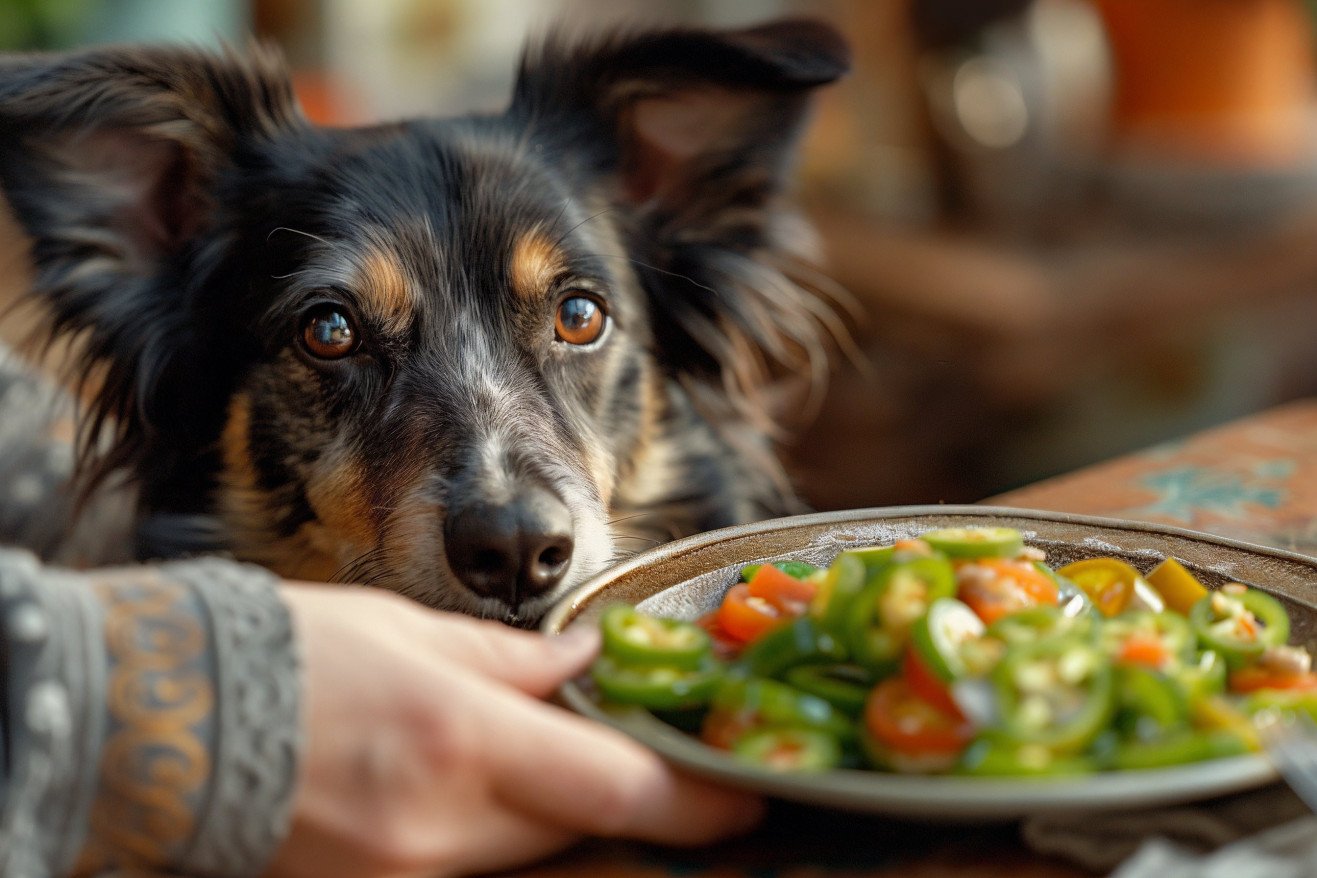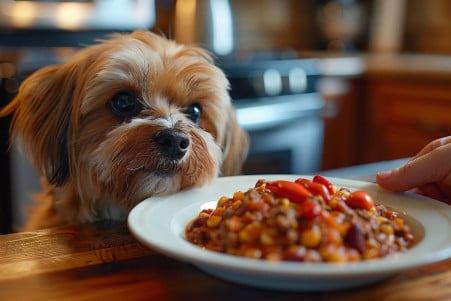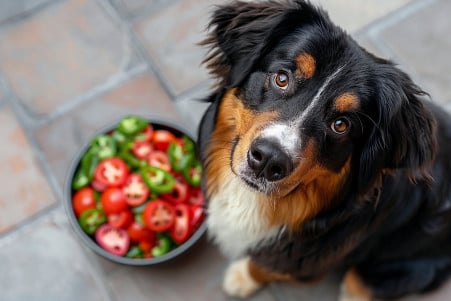Can Dogs Eat Jalapenos? Know the Risks
14 February 2024 • Updated 12 February 2024

While you may want to spice up your dog’s dinner, jalapenos are not the way to do it. Dogs should not eat jalapenos. The capsaicin in jalapenos can lead to gastrointestinal upset, including vomiting and diarrhea.
Although jalapeños are not poisonous to dogs, they can cause a lot of discomfort and other health problems. To be on the safe side, it’s best to only feed your dog foods that are known to be safe for them.
Our detailed look at what happens when dogs eat jalapenos will cover everything from expert veterinary opinions to nutritional research. We’ll start by looking at how dogs’ bodies work, including how their digestive systems react to capsaicin, the compound in jalapenos that makes them spicy.
We’ll also look at general dietary recommendations for dogs to see what kinds of foods are and aren’t good for them. After reading this evidence-based information, you’ll know what to look for when it comes to feeding your dog a healthy diet.
Can dogs eat jalapenos?
How Capsaicin Affects Dogs
Capsaicin is the active ingredient in jalapenos that makes them spicy. It is an irritant for mammals, including dogs, and can cause skin and eye irritation, but it is most irritating to the digestive system. When dogs consume capsaicin, it can lead to gastrointestinal upset, which can cause vomiting and diarrhea.
A study in PubMed showed that dogs had a rapid clearance of pure trans-capsaicin after intravenous administration, with minimal organ toxicities, although the dogs did experience temporary tachycardia and hypertension. This shows that while capsaicin can have immediate and noticeable effects on dogs’ cardiovascular systems, the overall toxicity is low, and dogs recover quickly.
However, capsaicin can also be used to help dogs. A study in Veterinary Medicine by Marcin Gołyński showed that dogs treated with habanero pepper extract containing capsaicin had anti-cancer effects. Over six months, some dogs showed a reduction in tumor size, which suggests that capsaicin could be a valuable area of research for cancer treatment in dogs.
Knowing this information is important for dog owners so they can make informed decisions about what to feed their pets and understand the potential risks and benefits of different food ingredients.
Knowing the Nutritional and Digestive Needs of Dogs
A dog’s diet should be tailored to their digestive system and nutritional needs, which require a balance of proteins, fats, carbohydrates, vitamins, and minerals to maintain their overall health. As noted by The Whole Dog Journal, dogs have a digestive system that has evolved to accommodate larger meals and longer storage times than humans.
While dogs started as obligate carnivores, they have evolved into facultative omnivores that can digest starch, as reported by PMC. This means that while dogs can eat a variety of foods, their diet should still be tailored to their digestive system.
That said, there are still foods that can be dangerous to dogs. The ASPCA lists some of the most common food toxicities in dogs, including chocolate, caffeine, and xylitol, all of which can be life-threatening.
Even spicy foods, like jalapenos, can cause digestive upset and other health issues in dogs. Because dogs have low enzymatic activity in their saliva and their digestive system is adapted to their ancestral diet, the introduction of spicy and irritating foods like jalapenos can lead to dysbiosis and other digestive issues.
This means that dog owners need to be mindful of what they feed their pets to avoid health problems and make sure they stay healthy. Dog owners should also make sure they know which foods are safe and healthy for dogs to eat.
Feeding Your Dog Healthy Veggies
In addition to being a staple of the human diet, vegetables can also be a source of nutrition for dogs. Feeding your dog vegetables that are safe for them can help ensure they get important vitamins and minerals and can also be a way to give them low-calorie treats.
Forbes suggested carrots, green beans, peas, and sweet potatoes as some of the best options. Not only are these vegetables safe, but they also offer a variety of health benefits, from helping with digestion to promoting healthy skin and coat.
In contrast to the potential dangers of spicy foods like jalapeños, these vegetables don’t contain capsaicin and are much easier on a dog’s stomach.
The Spruce Pets recommended introducing new vegetables to your dog one at a time and in small amounts to make sure they don’t cause any stomach upset.
You can also make vegetables easier for dogs to eat and digest by steaming or pureeing them. Still, it’s important to remember that you should feed your dog vegetables in moderation. According to the American Kennel Club, treats, even healthy ones like vegetables, should make up no more than 10% of a dog’s daily diet to ensure they get the balanced nutrition they need.
Feeding your dog a variety of vegetables can help keep their diet interesting and ensure they get a variety of nutrients that support their health.
What to Know About Dogs and Spicy Food
The evidence is clear that the impact of dogs eating jalapenos is negative. In fact, spicy food in general can be harmful to dogs. While dogs have a less sophisticated palate than humans, their sensitivity to capsaicin, the compound that makes food spicy, can lead to a lot of pain and discomfort.
In fact, dogs can even exhibit signs of stress like coughing, sneezing, or pawing at their faces due to the sensation caused by spicy food, according to Wag!.
In addition to these issues, spicy food can also cause gastrointestinal upset in dogs, leading to vomiting and diarrhea.
Because dogs are less tolerant of these irritants, even a small amount of spicy food can lead to these issues.
To keep your dog safe, make sure that spicy foods are out of reach and train your dog with commands like “leave it” to avoid accidental ingestion. If your dog does eat something spicy, The Spruce Pets advises against giving them dairy, which can make stomach issues worse, and instead suggests giving them a small amount of low-fat yogurt.
Of course, remember that avoiding the spice rack when it comes to your dog’s diet isn’t just about their taste preferences, it’s also about their health.
Conclusion: Can Dogs Have Jalapenos?
So, what can we conclude from the great jalapeño debate? It’s pretty clear that jalapeños are not something you should be feeding your dog. We’ve established that jalapeños contain capsaicin, which can cause gastrointestinal upset in dogs, leading to symptoms like diarrhea, vomiting, and general stomach upset. Although jalapeños aren’t poisonous, the discomfort and potential health problems they can cause are a good reason to stick to a dog-friendly diet.
An article by Pettable drives this point home, saying that dog owners should avoid feeding their pets human food, which their digestive systems can’t handle. Eating human food can lead to dogs gaining weight and can be bad for their heart, other organs, and the pancreas.
Instead, we should stick to dog treats that are made specifically for dogs to make sure that we’re keeping them healthy and helping them live longer. By understanding and following a dog’s dietary needs, we can make a big difference in their lives.
So let’s make sure we’re keeping their diets safe, fun, and appropriate so that we can have a long, happy life together.


